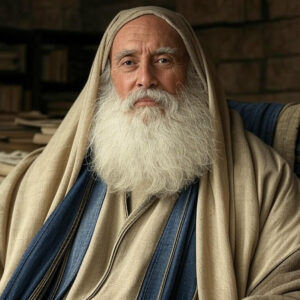It is  interesting how so many people of the Bible are tagged with descriptors based on something they did. Thomas was the doubter. Stephen was the martyr. Mary was the mother, and Leah had bad eyes. We also remember Judas the traitor, Joshua the warrior, and Naaman the leper. But there is another one who stands head and shoulders above all other people in the Bible for setting a remarkable record, and that’s Methuselah, the oldest!
interesting how so many people of the Bible are tagged with descriptors based on something they did. Thomas was the doubter. Stephen was the martyr. Mary was the mother, and Leah had bad eyes. We also remember Judas the traitor, Joshua the warrior, and Naaman the leper. But there is another one who stands head and shoulders above all other people in the Bible for setting a remarkable record, and that’s Methuselah, the oldest!
Genesis chapter 5 contains the record of the generations from Adam to Noah. In it we discover some rather startling things. We note that Adam was actually living during the days of Methuselah. In fact, he lived alongside Methuselah for over 100 years. We also notice that Methuselah was a contemporary of Noah for more than 300 years. He may have even helped with the construction of the ark. We might say he was the bridge between Adam and Noah. He could tell Noah all the details that Adam might have shared with him regarding the beautiful Garden and the sin that would be regretted for ages. But who was Methuselah? What does the Bible actually tell us about this man?
Unfortunately, that question is rather difficult to answer. Although he is named in Scripture seven times, all we know is that “Methuselah lived 969 years, and then he died” (5:27). That’s all! That is all God’s Word has to offer for this man’s nearly one thousand years of life? He lived one-sixth of the entire earth’s history! One can only speculate what kind of man he was.
First, we know that he was the son of Enoch. Enoch was such a faithful man that God walked with him into heaven at age 365. We can imagine that Enoch raised his family on the promises of the Lord. It might well have been that Methuselah was part of the search party that looked for his missing father.
Yet we are left wondering if Methuselah was a faithful man and if he walked in the ways of the Lord. His name leads us to even more speculation. Many scholars feel that his name actually means “when he dies it will be sent.” Can you imagine what that might mean? Does it seem at all significant that Methuselah died the same year as the flood? What an interesting angle to the great flood; someone was actually named “it’s coming when I die!”
We do not know exactly when Methuselah’s death took place. Some point to the fact that Noah and his family lived aboard the ark for seven days before the deluge began. Why? Might they have been recognizing the seven days of mourning that were required for patriarchs such as Methusaleh? Might the elderly Methuselah have died just a week prior to the flood?
We will never find those answers on this side of heaven. Yet we can still glean some bits of wisdom to take to heart. Methuselah is a prime example that it is not how long a life is lived but how a life is lived. Our God, to whom a thousand years is as a day, gives us each new day according to his will. David said it well when he wrote, “You have made my days a mere handbreadth; the span of my years is as nothing before you” (Psalm 39:5).
We can rejoice in the day we will be in heaven, when there will be no more days and weeks and years. In speaking about the new heavens and the new earth, Isaiah wrote, “Never again will there be in it an infant who lives but a few days, or an old man who does not live out his years; he who dies at a hundred will be thought a mere youth” (Isaiah 65:20).
O God, our help in ages past,
Our hope for years to come,
Our shelter from the stormy blast,
And our eternal home!
(from “O God, Our Help in Ages Past”)
